WASHINGTON: Lebanese President Michel Sleiman emphasized on Thursday the need to liberate Lebanese territories occupied by Israel and told US President George W. Bush that the future of Palestinian refugees was in their homeland, not in Lebanon. Bush welcomed Sleiman for talks Thursday to underline US support for democratic rule in Beirut free from any undue […]
 Naharnet, President Michel Suleiman said that Lebanon was fully committed to the implementation of U.N. Security Council Resolution 1701 and added that the nternational community should urge Israel to stop its threats against Lebanon. "Lebanon reiterates its full commitment to Resolution 1701," Suleiman said in a speech Tuesday before the 63rd U.N. General Assembly session in New York. "Lebanon is facing a series of dangers and challenges which require the international community to compel Israel to implement Resolution 1701
Naharnet, President Michel Suleiman said that Lebanon was fully committed to the implementation of U.N. Security Council Resolution 1701 and added that the nternational community should urge Israel to stop its threats against Lebanon. "Lebanon reiterates its full commitment to Resolution 1701," Suleiman said in a speech Tuesday before the 63rd U.N. General Assembly session in New York. "Lebanon is facing a series of dangers and challenges which require the international community to compel Israel to implement Resolution 1701
 BEIRUT: Reform and Change bloc leader MP Michel Aoun said Monday that he might walk out of the national dialogue because he could no longer deal with "corrupt people." At a news conference following his bloc’s weekly meeting, Aoun said that a conspiracy was being waged against the Lebanese "to buy their votes." Aoun added that the March 14 Forces’ suggestion to have mayors resign six months rather than 24 months prior to running for parliamentary elections constituted "a serious breach of the Constitution." "A mayor who resigns six months before running for elections can still make use of municipal funds to sponsor their electoral campaigns," Aoun said. Aoun also reacted to Lebanese Forces leader Samir Geagea’s speech on Sunday in which the LF leader apologized for "mistakes" committed by his militia during the 1975-1990 Civil War. Aoun said Geagea should have apologized "to [former Prime Minister Omar] Karami, the Chamoun family and [Marada Movement leader Sleiman] Franjieh." Aoun added that Geagea’s speech "influenced only those who are of marginal importance in the Christian community."
BEIRUT: Reform and Change bloc leader MP Michel Aoun said Monday that he might walk out of the national dialogue because he could no longer deal with "corrupt people." At a news conference following his bloc’s weekly meeting, Aoun said that a conspiracy was being waged against the Lebanese "to buy their votes." Aoun added that the March 14 Forces’ suggestion to have mayors resign six months rather than 24 months prior to running for parliamentary elections constituted "a serious breach of the Constitution." "A mayor who resigns six months before running for elections can still make use of municipal funds to sponsor their electoral campaigns," Aoun said. Aoun also reacted to Lebanese Forces leader Samir Geagea’s speech on Sunday in which the LF leader apologized for "mistakes" committed by his militia during the 1975-1990 Civil War. Aoun said Geagea should have apologized "to [former Prime Minister Omar] Karami, the Chamoun family and [Marada Movement leader Sleiman] Franjieh." Aoun added that Geagea’s speech "influenced only those who are of marginal importance in the Christian community."
Franjieh on Monday accepted the apology made by Geagea, but challenged the LF boss to accept reconciliation. "The apology made by Geagea is accepted although it was not addressed to us," Franjieh told a news conference, adding that he would deal "positively" with it. Geagea is accused of playing a leading role in the assassination of Franjieh’s father Toni Franjieh and dozens of other people in 1978. Addressing Geagea, Franjieh said: "Election results will show who enjoys wider popularity." Franjieh also criticized Maronite Patriarch Nasrallah Sfeir, calling on him to "refrain from dealing with Christians in a biased manner." Responding to Franjieh, LF MP Farid Habib said even after Geagea had declared his openness to other parties and apologized for abuses, Franjieh "is still attacking him and trying to distort the LF’s image." Habib told the reporters on Monday that he was not surprised by Franjieh’s verbal assaults "because anyone who dares to attack the Maronite patriarch will not hesitate to attack any political party.
Meanwhile, Karami said that the LF boss’ speech was important because it "proved that Geagea is a killer, criminal and liar, because he had previously announced that the Syrian regime was responsible for all the crimes." Geagea is also accused of assassinating Karami’s brother, then-Prime Minister Rashid Karami, in 1987. After meeting British Ambassador Frances Mary Guy on Monday, Karami said Geagea was trying to sway public opinion for electoral purposes. He said Geagea was not interested in reconciliation and wanted only to impose himself by force
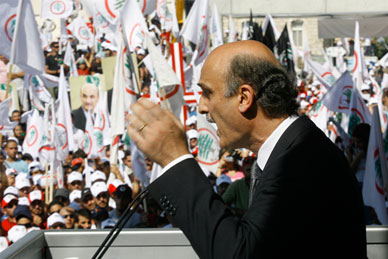 By Hussein Abdallah, BEIRUT: Lebanese Forces (LF) leader Samir Geagea apologized on Sunday for "mistakes" committed by members of his party during the 1975-1990 Civil War. "I fully apologize for all the mistakes that we committed when we were carrying out our national duties during past Civil War years," he said. "I ask God to forgive and so I ask the people whom we hurt in the past," he added. Speaking before tens of thousands of his supporters who gathered in Jounieh, north of Beirut, for a memorial ceremony for LF members killed during political violence in Jounieh, Geagea accused his political rivals of "exploiting past mistakes" that were committed by the LF. "I want to tell those who are exploiting our past mistakes to stop doing so because only God can judge us," he said. Geagea said that Christian unity was not possible in light of sharp differences over political principles and values among Christian leaders, hinting at his main rival, Free Patriotic Movement leader MP Michel Aoun. "I know that every one of you is longing to see Christian unity and reconciliation," he said. "This is also our aim, but the question: Over what values shall we unite?" "Shall we unite over Hizbullah’s possession of arms at the expense of the Lebanese state?" "Shall we unite over investigating the Lebanese Army command for sending the helicopter in which First Lieutenant Samer Hanna was shot in the Sejod Hills?" "Shall we unite over changing Lebanon into the only battlefield in the Arab-Israeli conflict while many others are negotiating with Israel?" Geagea asked as the crowd chanted anti-Aoun, anti-Hizbullah, and anti-Syrian slogans.
By Hussein Abdallah, BEIRUT: Lebanese Forces (LF) leader Samir Geagea apologized on Sunday for "mistakes" committed by members of his party during the 1975-1990 Civil War. "I fully apologize for all the mistakes that we committed when we were carrying out our national duties during past Civil War years," he said. "I ask God to forgive and so I ask the people whom we hurt in the past," he added. Speaking before tens of thousands of his supporters who gathered in Jounieh, north of Beirut, for a memorial ceremony for LF members killed during political violence in Jounieh, Geagea accused his political rivals of "exploiting past mistakes" that were committed by the LF. "I want to tell those who are exploiting our past mistakes to stop doing so because only God can judge us," he said. Geagea said that Christian unity was not possible in light of sharp differences over political principles and values among Christian leaders, hinting at his main rival, Free Patriotic Movement leader MP Michel Aoun. "I know that every one of you is longing to see Christian unity and reconciliation," he said. "This is also our aim, but the question: Over what values shall we unite?" "Shall we unite over Hizbullah’s possession of arms at the expense of the Lebanese state?" "Shall we unite over investigating the Lebanese Army command for sending the helicopter in which First Lieutenant Samer Hanna was shot in the Sejod Hills?" "Shall we unite over changing Lebanon into the only battlefield in the Arab-Israeli conflict while many others are negotiating with Israel?" Geagea asked as the crowd chanted anti-Aoun, anti-Hizbullah, and anti-Syrian slogans.
However, the LF chief added that Christian unity was the key to saving Lebanon, urging all Christians to take the right decision in next year’s parliamentary elections. "I call on the Christians who are against the Lebanese Forces or against me personally, to put Lebanon’s interests ahead of personal interests," he said. "We can only save Lebanon when the people of Lebanon as a whole and Christians in particular unite over the historic principles of Christians in Lebanon." He accused Christian members of the March 8 alliance of dropping the slogan, "my nation is always right" and replacing it with a slogan that says "Syria and Hizbullah are always right." Geagea said that both the Doha Accord and the ministerial statement of the new government stipulate that the state was the sole authority on defense issues. "We cannot accept that Hizbullah wants to maintain its arms until the liberation of Palestine and the resolution of the Middle East conflict," he said. Geagea also argued against Hizbullah’s claim that it should maintain its arms until the state acquires the necessary capabilities to defend Lebanon. The event was attended by several senior officials, including Finance Minister Mohammad Shatah, representing Prime Minister Fouad Siniora, and former President Amin Gemayel. President Michel Sleiman, who left for New York Sunday, contacted Geagea to offer his condolences. Parliamentary majority leader Saad Hariri also congratulated him for the "success" of the memorial ceremony.
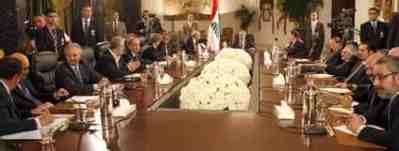 BEIRUT (AFP) Lebanon’s rival factions launched national reconciliation talks on Tuesday to resolve lingering disputes after a crisis that brought the nation to the brink of civil war, with the thorny issue of Hezbollah’s weapons topping the agenda. The talks bring together 14 political figures from the country’s pro- and anti-Syrian camps who agreed to try to mend fences following a Qatari-brokered deal in May that put an end to a damaging 18-month political crisis. "Agreeing to dialogue in and of itself means that all subjects are open to discussion," President Michel Sleiman said as he opened the talks. "The only thing banned here is failure or a reaching a dead-end."
BEIRUT (AFP) Lebanon’s rival factions launched national reconciliation talks on Tuesday to resolve lingering disputes after a crisis that brought the nation to the brink of civil war, with the thorny issue of Hezbollah’s weapons topping the agenda. The talks bring together 14 political figures from the country’s pro- and anti-Syrian camps who agreed to try to mend fences following a Qatari-brokered deal in May that put an end to a damaging 18-month political crisis. "Agreeing to dialogue in and of itself means that all subjects are open to discussion," President Michel Sleiman said as he opened the talks. "The only thing banned here is failure or a reaching a dead-end."
The main focus of the dialogue will be on forging a defence strategy for Lebanon but there is widespread scepticism that an agreement can be reached given deep-seated divisions over Hezbollah’s weapons arsenal. The Shiite Muslim group, considered a terrorist organisation by the United States, has refused to disarm arguing that its weapons and guerrilla army are essential to defend the country against neighbouring Israel. However members of the Western-backed majority in parliament argue that Hezbollah’s weapons undermine the authority of the state which should be the sole decision-maker on matters of defence.
"All Lebanese are hoping that the dialogue will be successful but a real solution will only be found when Hezbollah stops using its weapons to serve regional interests and stops imposing its hegemony by force on the local scene," said an editorial in An-Nahar newspaper, which is close to the anti-Syrian ruling coalition in parliament. Newspapers close to the rival camp backed by Syria and Iran said those taking part in the dialogue face an arduous task given their differences. "The various political camps believe the discussions on the national defence strategy will get bogged down into futile debate and no one will see any results for a long time," the As-Safir newspaper said. The independent Al-Anwar said the closed-door talks were taking place "in a minefield called Lebanon, with the mines produced locally and abroad." The dialogue follows on from a 2006 initiative in which the same 14 factions held several round-table meetings in a bid to forge political unity. But there have been heightened security concerns in the country following the killing last week of a pro-Syrian politician in a car bombing and a number of violent incidents. Six makeshift bombs exploded early on Monday in a mixed Sunni-Shiite area of west Beirut and two similar bombs were defused by the Lebanese army near a church north of the capital. Tuesday’s talks are to set the agenda and timetable for talks, with the next session set to take place after Sleiman returns from a visit to the United States later this month.
كلمة النائب نعمة الله أبي نصر التي ألقاها
في المؤتمر الذي نظّمته اللجنة اللبنانية الأميركية لإحياء الشراكة LARP
بالتعاون مع الغرفة اللبنانية للتجارة في فندق فينيسيا
بحضور ممثل فخامة رئيس الجمهورية الوزير محمد الصفدي

حَضرَة مُمثِّل فَخامَة رئيس الجمهورية معالي الوزير محمد الصفدي المُحتَرَم،
أيُّهـا الحَضُـورُ الكِـرام ،
بادِئ ذِي بِدْء ، أوَدُّ أن أشْكُرَ مُؤسَّسَةَ LARP رئيساً وأعضاءَ ، والغُرفَةَ اللبنانية الأميركية للتِجارَةِ ، لِتنظيمِهما هذا المُؤتَمَر الذي أفْسَحَ لَنا المَجالَ لنُناقِشَ سَويَّةً السُبُلَ الآيِلَةَ الى اِلتضامُنِ والتواصُلِ بينَ لُبنانَ المُقيمِ والمُغتَرِب .
لا حاجََة للتَّذْكِيْرِ كَمْ أنَّ لُبْنانَ اليَوْم هُوَ بحاجَةٍ إلَى أبْنائِهِ المُغْتَرِبِيْنَ ولاسِيَّما في هَذِهِ المَرْحَلَةِ بالذَّاتِ، حَيْثُ أنَّ الأنْظارَ جَمِيْعَها تَتَّجِهُ نَحْوَكم مِنْ أجْلِ اجْتِذابِ أولادِنا في الإغترابِ نَحْوَ وَطَنِهم الأمِّ ، وتَشْوِيْقِهِم للعَوْدَةِ إلَيْهِ ، وتَرْغِيْبِهِم في اسْتِثْمارِ طاقاتِهِم السياسيَّة والمادِيَّة والفِكْرِيَّة والروحِيَّة والعِلْمِيَّة والمِهَنِيَّة في مُخْتَلَفِ قِطاعاتِ المُجْتَمَعِ اللُّبْنانِيِّ ، بُغْيَةَ المُساهَمَةِ في إعادَةِ إحْيائِها وإنْعاشِها ، لأنَّ إعادَةَ البِناءِ لا تَتِمُّ ، ولُبْنان لا يُبْنَى إلاَّ عَلى سَواعِدِ أبْنائِهِ أنْفُسِهِم مُقِيْمِيْنَ ومُغْتَرِبِيْنَ ، مسيحييِّنَ ومُسلِمينَ .
لَنْ أتوَسَّعَ في تبيانِ أهميَّةِ الإغتِرابِ اللُبنانيِّ وعَظَمَتِه وتفَوُّقِهِ في العالَم في كُلِّ المَجالاتِ السياسيَّةِ والإقتِصاديَّةِ والإجتِماعيَّةِ والفكريَّة والمِهنيَّةِ وغيرِها .
ولَنْ أتوقَّفَ حولَ إهمالِ الإغتِرابِ اللُبنانيِّ من قِبَلِ الحكوماتِ التي تعاقَبَتْ على الحُكمِ في لُبنان منذُ الإستِقلالِ حتى اليوم، هذا الإهمالُ الذي يكادُ يكونُ متعمداً لولا لَفتَةٍ كريمَةٍ جاءَت بالأمسِ من قِبَلِ فخامَةِ رئيسِ الجُمهوريَّة حيثُ تَعَهَّدَ في خِطابِ القَسَم تعزيزَ التواصُلِ بينَ لُبنانَ المُقيمِ والمُغتَرِبِ بُغيَةَ الإستِفادَةِ من طاقاتِ أبنائِنا في الإغتِراب، حيثُ هُم أحقُّ بالجنسيَّةِ اللُبنانيَّةِ مِنَ الذينَ أخذوها على غيرِ وجهِ حَقٍّ .
وإنّي أرى في اجتِماعِكُم هذا ، بُزوغَ أملٍ جديدٍ للتواصُلِ الفعليّ بينَ لبنان بجناحّيهِ المُقيمِ والمُغتَرب . ولَكِن كَيْفَ السبيلُ لِتحقيقِ هذا الأمَل ؟!
إنَّ الرابِطَ الأقوى الذي من شأنِهِ أنْ يَشُدَّ المُغتَرِبَ الى لُبنان هوَ رابطُ الهويَّةِ وما يَنتُجُ عنها من مَجالاتٍ على كافَةِ الصُعُد ، كحقِّ التمَلُكِ والإرثِ ومُمارَسَةِ المِهَنِ ، والتمتُعِ بالحُقوقِ السياسيَّةِ والإقتِصاديَّة والدُخولِ في الوَظيفَةِ العامَّةِ … ألخ . وباختِصار: فالهُوِيَّةُ اللُبنانيَّة تُمكِّنُ المُغتَرِبَ من وَضعِ كافَةِ طاقاتِهِ الفكريَّة والتقنيَّة والعلميَّة والماديَّة في خِدمَةِ لُبنان والإسهامِ في تَطَوُرِهِ وتقَدُّمِهِ ورُقيِّهِ ، وصولاً الى مصافِ الدُولِ المُتطوِّرَة الحديثَة
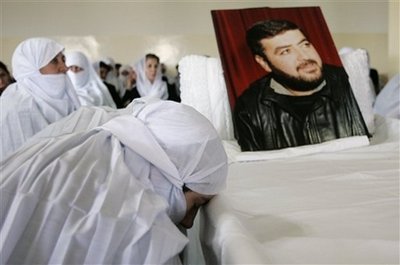 By Agence France Presse (AFP), BEIRUT: Lebanese and international leaders urged calm on Thursday as they condemned a political assassination that threatened to undermine efforts to reconcile rival factions in Lebanon. Saleh Aridi, a senior member of the Lebanese Democratic Party, was assassinated in a car bombing late on Wednesday in his hometown of Baysour, southeast of Beirut. A security official said the bomb, made of 700 grams of explosives, was placed under his car. There was no immediate claim of responsibility. United Nations Secretary General Ban Ki-moon on Thursday condemned the car bombing and urged rival parties to show "restraint." "This violence only underscores how important it is for dialogue and reconciliation to move forward," the UN chief told a news conference. Six people were also slightly wounded in the attack, which was also condemned by both Washington and
By Agence France Presse (AFP), BEIRUT: Lebanese and international leaders urged calm on Thursday as they condemned a political assassination that threatened to undermine efforts to reconcile rival factions in Lebanon. Saleh Aridi, a senior member of the Lebanese Democratic Party, was assassinated in a car bombing late on Wednesday in his hometown of Baysour, southeast of Beirut. A security official said the bomb, made of 700 grams of explosives, was placed under his car. There was no immediate claim of responsibility. United Nations Secretary General Ban Ki-moon on Thursday condemned the car bombing and urged rival parties to show "restraint." "This violence only underscores how important it is for dialogue and reconciliation to move forward," the UN chief told a news conference. Six people were also slightly wounded in the attack, which was also condemned by both Washington and 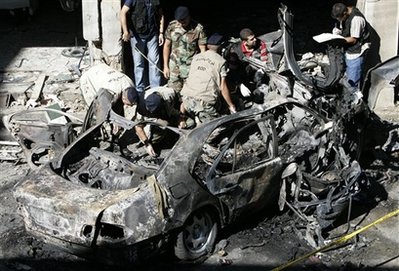 Damascus. "The United States is deeply concerned about the latest violence in Lebanon," State Department spokesman Sean McCormack said in a statement. "Our support for the Lebanese government and its democratic institutions is unwavering," he added. The Syrian Foreign Ministry said that Damascus "firmly denounces the criminal and terrorist act," adding that Syria was "convinced that such crimes that target security and stability in Lebanon will not achieve their objectives." The European Union also condemned the crime and called for an investigation into the killing. Speaking on behalf of the EU, a French Foreign Ministry spokesman said that the EU supported Lebanon’s efforts "to stop terrorism."
Damascus. "The United States is deeply concerned about the latest violence in Lebanon," State Department spokesman Sean McCormack said in a statement. "Our support for the Lebanese government and its democratic institutions is unwavering," he added. The Syrian Foreign Ministry said that Damascus "firmly denounces the criminal and terrorist act," adding that Syria was "convinced that such crimes that target security and stability in Lebanon will not achieve their objectives." The European Union also condemned the crime and called for an investigation into the killing. Speaking on behalf of the EU, a French Foreign Ministry spokesman said that the EU supported Lebanon’s efforts "to stop terrorism."
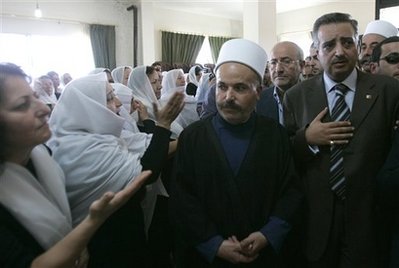 Lebanese President Michel Sleiman warned against any attempt to derail efforts under way to achieve national reconciliation, with the attack taking place just a day after he announced the start of a multi-party dialogue next Tuesday. "We must beware of conspiracies aimed … at scuttling efforts toward reconciliation and preparations for national dialogue," the president said in a statement. Aridi, in his 50s, was a top adviser to pro-Syrian Druze leader and Youth and Sports Minister Talal Arslan, a rival to Druze anti-Syrian leader Walid Jumblatt. Aridi’s father is also a leading Druze religious figure. Jumblatt denounced the attack as a bid to sow violence between his party and Arslan’s, after the two had reconciled in May following fierce clashes between rival clans. The slain adviser had played a key role in the
Lebanese President Michel Sleiman warned against any attempt to derail efforts under way to achieve national reconciliation, with the attack taking place just a day after he announced the start of a multi-party dialogue next Tuesday. "We must beware of conspiracies aimed … at scuttling efforts toward reconciliation and preparations for national dialogue," the president said in a statement. Aridi, in his 50s, was a top adviser to pro-Syrian Druze leader and Youth and Sports Minister Talal Arslan, a rival to Druze anti-Syrian leader Walid Jumblatt. Aridi’s father is also a leading Druze religious figure. Jumblatt denounced the attack as a bid to sow violence between his party and Arslan’s, after the two had reconciled in May following fierce clashes between rival clans. The slain adviser had played a key role in the 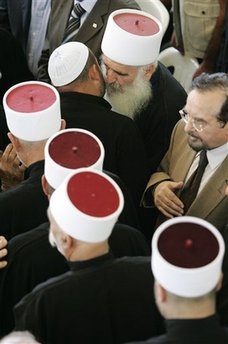 reconciliation effort. Aridi, who was married and had five children, is scheduled to be buried in his hometown at 1 p.m. on Friday. "Message received," said Arslan, who rushed back to Lebanon from abroad on hearing of the killing. He refused to speculate as to who was behind the attack. Arslan, who offered his condolences to Sheikh Farhan Aridi, Saleh’s father, told reporters in Baysour that the mountains would stay united despite attempts to sow discord. "What you and I have started together on May 7 shall continue for the sake of the mountains and the nation," Arslan said in reference to Aridi’s efforts to reconcile Druze factions. The Democratic Party leader also stressed that "while political differences are legitimate, unrest and divide are forbidden." He added that the crime would be referred to the Judicial Council, the country’s highest judicial authority.
reconciliation effort. Aridi, who was married and had five children, is scheduled to be buried in his hometown at 1 p.m. on Friday. "Message received," said Arslan, who rushed back to Lebanon from abroad on hearing of the killing. He refused to speculate as to who was behind the attack. Arslan, who offered his condolences to Sheikh Farhan Aridi, Saleh’s father, told reporters in Baysour that the mountains would stay united despite attempts to sow discord. "What you and I have started together on May 7 shall continue for the sake of the mountains and the nation," Arslan said in reference to Aridi’s efforts to reconcile Druze factions. The Democratic Party leader also stressed that "while political differences are legitimate, unrest and divide are forbidden." He added that the crime would be referred to the Judicial Council, the country’s highest judicial authority.
By Hussein Abdallah, BEIRUT: President Michel Sleiman was quoted by his visitors on Sunday as denying that his Syrian counterpart, Bashar Assad, asked him during their recent bilateral summit in Damascus to send the Lebanese Armed Forces’ 10th Brigade to "fight extremism" in Tripoli. The visitors said that Sleiman also denied that he made any […]
 CAIRO, Egypt (AP) — It’s the Mideast version of a sordid soap opera. A Lebanese pop star is brutally slain in her luxury Dubai apartment, her throat slashed. Arrested in her death: One of Egypt’s most politically connected businessmen, accused of paying $2 million to have her killed.The killing of Suzanne Tamim has gone beyond a lurid crime story to something more serious — a glimpse into the close links between Egypt’s government and powerful business tycoons long viewed as above the law. It is also exposing strains between societies like Egypt’s, where wealth and political power increasingly go hand in hand, and Dubai, which recently launched a high-profile push against corruption. People in the Arab world have long followed with fascination and moral clucking the tales of businessmen and politicians cavorting with actresses, belly-dancers and singers — a sort of Hollywood Babylon in the conservative Muslim Middle East. But even by those standards, the Tamim drama is a stunner. The 30-year-old singer, famed for her striking green eyes, was found dead in her Dubai apartment in July, with multiple stab wounds and a 20-centimeter (8 inch) slash across her throat. This week, Egyptian authorities arrested real estate mogul Hisham Talaat Moustafa, said to be Tamim’s former lover. For many, the surprise wasn’t Moustafa’s alleged involvement — but his arrest. Egyptians are widely convinced their government won’t touch influential businessmen. When Moustafa’s name first appeared in media reports weeks ago, he denied a role and complained on Egyptian television that the rumors hurt the economy. The government promptly banned press reports on the slaying, suggesting that Moustafa was off-limits. The tycoon is a top ruling party official close to President Hosni Mubarak’s powerful son, Gamal. In the past 10 years, he has become one of Egypt’s top billionaires, the owner of luxury hotels and beach resorts and a leading force in building Western-style suburbs ringing Cairo for the upper-class.But on Tuesday, Egypt’s public prosecutor accused the tycoon of contracting for the singer’s killing by paying $2 million to Mohsen el-Sukkary, a former Egyptian state security officer.
CAIRO, Egypt (AP) — It’s the Mideast version of a sordid soap opera. A Lebanese pop star is brutally slain in her luxury Dubai apartment, her throat slashed. Arrested in her death: One of Egypt’s most politically connected businessmen, accused of paying $2 million to have her killed.The killing of Suzanne Tamim has gone beyond a lurid crime story to something more serious — a glimpse into the close links between Egypt’s government and powerful business tycoons long viewed as above the law. It is also exposing strains between societies like Egypt’s, where wealth and political power increasingly go hand in hand, and Dubai, which recently launched a high-profile push against corruption. People in the Arab world have long followed with fascination and moral clucking the tales of businessmen and politicians cavorting with actresses, belly-dancers and singers — a sort of Hollywood Babylon in the conservative Muslim Middle East. But even by those standards, the Tamim drama is a stunner. The 30-year-old singer, famed for her striking green eyes, was found dead in her Dubai apartment in July, with multiple stab wounds and a 20-centimeter (8 inch) slash across her throat. This week, Egyptian authorities arrested real estate mogul Hisham Talaat Moustafa, said to be Tamim’s former lover. For many, the surprise wasn’t Moustafa’s alleged involvement — but his arrest. Egyptians are widely convinced their government won’t touch influential businessmen. When Moustafa’s name first appeared in media reports weeks ago, he denied a role and complained on Egyptian television that the rumors hurt the economy. The government promptly banned press reports on the slaying, suggesting that Moustafa was off-limits. The tycoon is a top ruling party official close to President Hosni Mubarak’s powerful son, Gamal. In the past 10 years, he has become one of Egypt’s top billionaires, the owner of luxury hotels and beach resorts and a leading force in building Western-style suburbs ringing Cairo for the upper-class.But on Tuesday, Egypt’s public prosecutor accused the tycoon of contracting for the singer’s killing by paying $2 million to Mohsen el-Sukkary, a former Egyptian state security officer.
 BEIRUT (AFP) – Anti-Syria parliamentary majority leader Saad Hariri has accused Syrian President Bashar al-Assad of trying to use unrest in north Lebanon to engineer a return to military control of the country, a statement received by AFP on Saturday said. "Those who export terrorism to north Lebanon do not have the right to fear the rise of extremism in Lebanon," Hariri said during Friday’s Ramadan meal."(The Syrians) want to use the situation in Tripoli as a pretext to involve themselves in Lebanese affairs and use it as a means for their military and security return to Lebanon," the Future Movement chief said.Assad said on Thursday he had asked Lebanese President Michel Sleiman to urgently send more troops to northern Lebanon to combat what he called "extremism." "The Lebanese clearly remember who sent Fatah al-Islam to Nahr al-Bared and to the north and who has — and continues to — finance terrorist activities in other regions," Hariri’s statement added. The Nahr al-Bared Palestinian refugee camp north of Tripoli was the scene of a deadly 15-week battle last year between the army and Fatah al-Islam, which adopted an ideology inspired by Al-Qaeda.
BEIRUT (AFP) – Anti-Syria parliamentary majority leader Saad Hariri has accused Syrian President Bashar al-Assad of trying to use unrest in north Lebanon to engineer a return to military control of the country, a statement received by AFP on Saturday said. "Those who export terrorism to north Lebanon do not have the right to fear the rise of extremism in Lebanon," Hariri said during Friday’s Ramadan meal."(The Syrians) want to use the situation in Tripoli as a pretext to involve themselves in Lebanese affairs and use it as a means for their military and security return to Lebanon," the Future Movement chief said.Assad said on Thursday he had asked Lebanese President Michel Sleiman to urgently send more troops to northern Lebanon to combat what he called "extremism." "The Lebanese clearly remember who sent Fatah al-Islam to Nahr al-Bared and to the north and who has — and continues to — finance terrorist activities in other regions," Hariri’s statement added. The Nahr al-Bared Palestinian refugee camp north of Tripoli was the scene of a deadly 15-week battle last year between the army and Fatah al-Islam, which adopted an ideology inspired by Al-Qaeda.
A statement issued by the ruling majority on Thursday night said Assad has no right to ask the Lebanese president to send Lebanese army units to northern Lebanon, and such a request is an "interference in Lebanese internal affairs, and result from non-recognition of Lebanon’s sovereignty and independence."
The statement also said such an request is "an insult to Lebanese president." Assad Thursday said at a press conference that he had told the Lebanese president during the latter’s visit to Damascus to send more troops to northern Lebanon to stop clashes between Sunnis and Alawites in Tripoli and some villages of Akkar province. During the past three months, clashes between the two sects in northern Lebanon have left more than 23 people killed and hundred others wounded. Meanwhile, Assad’s invitation for talks with Israel was also rejected by the Lebanese ruling coalition, saying "Lebanon will be the last country to sign settlement agreement with Israel after reclaiming Arab rights."